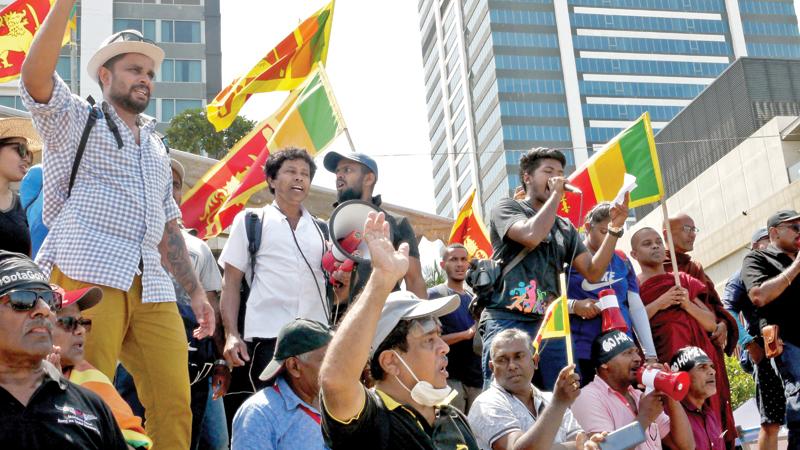
Sri Lanka is facing its worst economic crisis since independence from Britain in 1948 after it ran out of dollars to import even the most basic essentials. The pandemic severely impacted the economy, which was recovering from the shock of the Easter Sunday attacks.
 Even before the attacks, Sri Lanka’s economy was stagnating, with low growth rates and low investor confidence. Despite the World Bank classifying Sri Lanka as an upper middle-income country in July 2019, investors remained circumspect owing to substantial debt repayment due between 2019 and 2024, which will put pressure on public finances and foreign reserves. The government was forced to implement strict import controls to compensate for the drop in foreign remittances and tourist income due to the Covid-19 pandemic.
Even before the attacks, Sri Lanka’s economy was stagnating, with low growth rates and low investor confidence. Despite the World Bank classifying Sri Lanka as an upper middle-income country in July 2019, investors remained circumspect owing to substantial debt repayment due between 2019 and 2024, which will put pressure on public finances and foreign reserves. The government was forced to implement strict import controls to compensate for the drop in foreign remittances and tourist income due to the Covid-19 pandemic.
Quick and stern action
This being the backdrop, given the current scenario, Sri Lanka’s economy will “collapse beyond redemption” unless stern steps are taken within the next several weeks to restore political stability.
The recent wave of mob violence and more uncertainties brewed as a result derailed the Central bank’s recovery plans. Last week, the crisis took an ugly turn with nine people killed in violence and over 200 injured. Currently the country is in a deadlock with more complexities and questions compared to several weeks ago. President left the country with the support of the SL Air Force. Protesters stormed the PM’s secretariat – what’s next? Only God knows. Political stability is vital to implementing economic reforms aimed at addressing the country’s debt crisis and the acute shortage of foreign exchange to import essentials. If there is no stable government soon, the economy will completely collapse and no one will be able to save it. It will be a collapse beyond redemption.
Highest ever inflation
Interest rates are at their highest ever, the Treasury Bill ceiling rate was 35% last week. The economic consequences of these rising interest rates are beyond comprehension. Inflation will continue to skyrocket. Consumer buying power will continue to slide. Not only non-essential but the market for essentials too will crash. Good percentage of business organisations will go bankrupt. Money printing will be the only option to pay the government servants salaries.
Productivity is the only way out
Politicians don’t create economic value. The only set policies conducive for economic growth.
Our successive political parties have failed to set and sustain consistent economic policies for the private sector to drive the economy and the public sector to create an enabling environment.
We have had a welfare economy, hence a welfare mind-set. We expected politicians to put food on the plate. People in the workforce have to generate value for the country. Companies have to formulate and play winning strategies to earn foreign currency.
Not sell products but brands to fetch the right margins since we have no economies of scale to fight with larger geographies.
Low productivity
Today, we take a look at one very disturbing aspect of Sri Lanka’s lack of global competitiveness and very low productivity – in fact we are one of the lowest in the world. The low productivity of our workforce, in particular the quality of work and the number of hours that our people actually work in comparison to our competitors and global standards.
Sri Lanka is famous for having an enormous number of holidays – so let’s not even get into that. However, there are also a number of key issues that drastically reduce the productivity of our workforce, which in turn makes our country very unattractive to foreign investors.
Poor work ethics has been a chronic issue in Sri Lanka. Ethical standards should be high and should apply to all aspects of an employee’s job activities. This includes how they communicate with teams, how they respect each other, honesty and accountability, how they do their business, and how they deal with employees and customers.
Companies give employees lunch breaks and people use these breaks to accomplish other things outside office jobs such as meeting with friends or even working on their side business. These lunch breaks are used by employees and extended beyond time.
It’s common to see employees have side businesses to earn extra income. The public sector is even worse. We see how Indian and Chinese workers work here. They work 12 hours or more. Obey rules to the last letter. Fully adhere to the given breaks. Look at how other western countries work. See how Sri Lankans work when they go abroad for jobs. If you have friends or relatives just ask them. Sometimes they do two jobs to survive.
Finally, the essence of civilised living is the rule of law. A prerequisite for a good democracy and a prosperous society is the rule of law. All citizens of SL should respect and align if we want economic recovery. If not it will be a disaster and the country’s economy will be beyond redemption.
